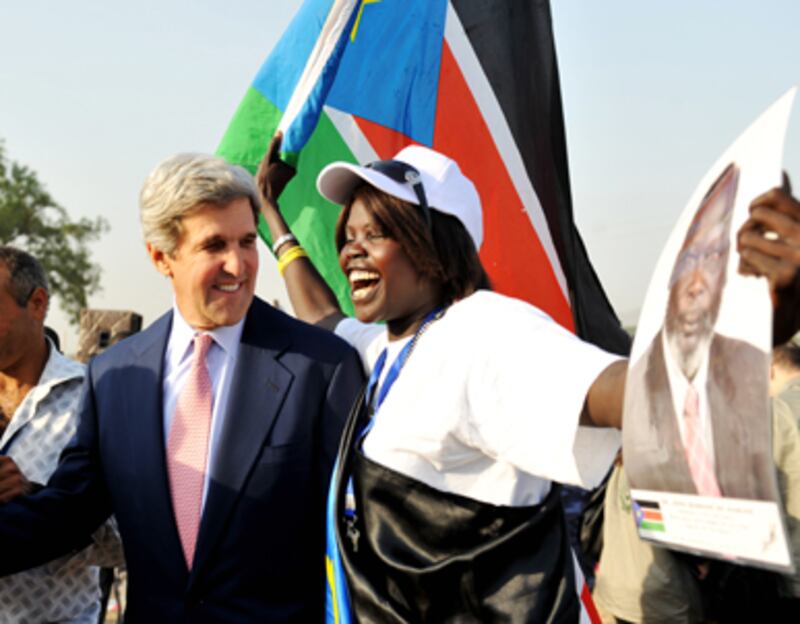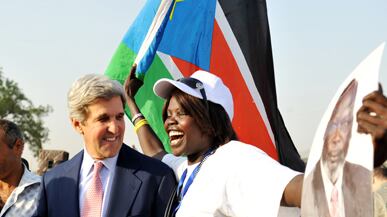After walking across Sudan during two decades of civil war, 17 “Lost Boys” took a final step toward liberty on Sunday morning, joining their fellow Southern Sudanese in a long-awaited vote for independence.
“After all of the struggle, loss of life, separation, and killing, we can see that we are now allowed to vote freely for our destiny,” Valentino Achak Deng told me in the southern capital city of Juba, along the banks of the Nile. Deng, the subject of a “fictionalized memoir” by Dave Eggers, What Is the What?, helped tell the story of the Lost Boys and the suffering of Southern Sudan. Now he is both witnessing and participating in a new chapter in the deeply troubled history of the region, this one framed by hope for peace and stability. “We’re going to vote in large numbers, together, and then just look at our faces and our eyes and be happy,” Deng said.

At stake in the seven-day referendum is the separation of Africa’s largest state into two sovereign states. The divisions between the Muslim and Arab-dominated government in the north and the Christian and African tribal populations of the south have been festering since end of colonial rule in 1956. In 1983, those tensions erupted into a 20-year civil war that killed 2.5 million people. As North and South negotiated a peace treaty that would be signed in 2005, Sudan’s president, Omar al-Bashir, began a genocide against Muslims in Darfur, a western province of Sudan; he has since been indicted by the International Criminal Court for his crimes there.
The Bush administration negotiated the comprehensive peace agreement of 2005 and set Jan. 9, 2011, as the date of a Southern Sudan referendum to decide the fate of the two-state solution.
As this hopeful and historic day unfolded, and counter to most official expectations, the south resisted provocations in the early going--only to see the initial triumph tested by reports of violent clashes Monday.
It is a moment of unaccustomed celebration in a country that has known unimaginable suffering. Poverty endures even in the bustling port city of Juba, where the buildings are one story with tin roofs, the roads mostly unpaved, and trash and rubble covered with red dust under a broad blue sky. But the spirit of the Southern Sudanese people is a mix of jubilation and determination, as they anticipate deliverance in the birth of the world’s newest nation.
Over the past four days, I have traveled throughout Juba and flown up to the contested state of Abyei, the likely next flashpoint between north and south, with George Clooney and John Prendergast of the Enough Project, who used several previous trips to Sudan to bring international scrutiny to the conflict. I now find myself witnessing up close the creation of a new democracy, a rare occasion this side of the fall of the Berlin Wall. Many challenges remain, but the start of this referendum promises a new era.
Crowds started to gather outside polling stations in Juba at 3 a.m. on Sunday morning. When the polls opened five hours later, the lines were double deep and remained packed until closing at 5 p.m. Men and women wore brightly colored suits and dresses for the occasion and waved their voter registration cards in the air as evidence of their new electoral empowerment. I asked one young man named Gaddafi how it felt to vote for the first time. He paused for a moment, as if overcome by the reality, then replied, “I feel free at last, free at last, like Martin Luther King. Thank God almighty we are free at last.”
“We’re going to vote in large numbers, together, and then just look at our faces and our eyes and be happy.”
Barring massive fraud, there is little doubt the south will vote overwhelmingly for secession—the betting at local bars is on whether the vote in favor will be over or under 95 percent. But there is another threshold that must be passed: verification that 60 percent of the 3.9 million registered South Sudanese voters participated in the referendum.
Street signs and billboards here are uniformly pro-independence, telling passers-by that a “yes” vote for secession, signified by an open hand, rather than a clenched fist, is a “symbol of dignity” and a “symbol of justice.” Poll watchers are more muted, wearing white hats imprinted with the words “Vote Wisely.” It is difficult to find any Southerner who wants to remain part of the existing Sudanese state under Sharia law—unsurprising, considering the 55 years of struggle and 2.5 million lives that have been lost fighting for independence.
Additionally, an estimated 40,000 refugees known locally as “Returnees” have flooded the south over the past three months to participate in the referendum and build a new life in their new nation. At a visit to the Port of Juba on Thursday, I spoke to several of the returnee families who now sit on Southern soil surrounded by piles of their belongings, like a house without walls. I asked Santiago MacWhite where he would make his permanent home. “I am home beneath this tree,” he said through a translator. “I am free. I am home.”
For all the spirit of celebration, the referendum’s success was far from ordained. Just three months ago, it was widely believed that the voting would have to be pushed back or delayed indefinitely. International attention had shifted away from Sudan in the aftermath of the peace accords, and “Save Darfur” started to sound like a dusty bumper sticker from 2005. With decreased attention came increased tension between the north and the south. Secretary of State Hillary Clinton warned that Sudan was “a ticking time bomb,” while then-Director of National Intelligence Dennis Blair declared that “a new mass killing or genocide is most likely to occur in Southern Sudan.”
But renewed focus on Sudan from the Obama administration, including the appointment of Senator John Kerry as a special negotiator, helped turn the tide. Clooney raised public awareness about the referendum with his high-profile visits, reaching a far larger audience than a United Nations press release ever could and pressuring elected officials to keep plans for the referendum on course. And in October, China surprised observers by announcing that it would support the outcome of the voting, making it more difficult for the north to suppress the south without displeasing its largest investor. The South Sudanese leadership rose to the occasion as well under the leadership of one-time rebel leader and current Vice President Salva Kiir, whose trademark black cowboy hat was a gift from George W. Bush. Sending a message of restraint in the event of violent provocation, Kiir also drew tribal leaders into a new coalition committed to the creation of the world’s 193rd nation.
On this first day of referendum voting, there were, however, two reports of tribal violence. They occurred in the provinces of Unity State and Abyei in the 48 hours before people went to the polls. Specifics are slow to travel in Sudan, and even local government officials seemed short on detailed information, but unconfirmed reports from the regions indicate that four people were murdered in Unity State and as many as 30 in Abyei.
Reports of the violence have thus far failed to dampen the hopeful tone of Sunday’s voting. But serious hurdles await the fledgling state. A new government will need to be formed, and official independence will not be granted until July 9. This gives the north at least six months to disrupt the transition and derail the secession after the international camera crews depart. And it's anybody's guess whether Monday's clashes portend greater conflict.
While President Bashir has earned a reputation as an untrustworthy negotiator, he recently has said repeatedly that he will accept the results of the referendum. In a telephone call on Sunday with reporter Ellen Knickmeyer on behalf of The Daily Beast, Rabie Abdullati Obeid, a senior member of the president’s National Congress Party, reiterated that pledge. “No, no, no, there’s not any possibility of war,” Obeid said, speaking from Khartoum. “Whatever the case, whatever the outcome of the referendum, be it secession or unity, there’s no inclination to war.”
Nonetheless, a contentious issue remains in the fate of the still-contested border state of Abyei. In closed-door meetings, tribal leaders made it clear that their people’s allegiance is with the south, though they are legally barred from participating in the referendum. Their frustration could result in a popular declaration of affiliation with the south at any time, which could in turn provoke an attack. Tribal proxy wars have proved a devastatingly effective tactic for the north in the past, with the town of Abyei entirely destroyed as recently as 2008.
“If the north thinks they could do something and get away with it without dramatic serious implications, they are making the biggest mistake of a lifetime,” Senator Kerry told me before he left Sudan on Sunday afternoon. “I think they know that. I think both sides are committed to avoiding a war. But sometimes things happen on the ground that can spiral out of control.”
Mindful of such risks, Clooney and Prendergast have organized a privately financed satellite project that provides real-time imaging of the Sudanese north-south border to interested global citizens from their computers. With its ability to keep public attention focused on any troop build-up along the border, this new tool is an example of the kind of innovation and continued international commitment that will be necessary to complete the peaceful transition of Southern Sudan to independence.
Even given the many challenges ahead—and with the balance of the week’s polling activity still to come—one could not help but savor this first day in Southern Sudan’s civic resolve, for it represented the at least temporary triumph of hope over hate. One-time killing fields are being transformed into a fledgling democracy that promises to be an ally of the United States, with English as its official language. This story is far from over, the more so since the world cannot afford to turn the page assuming a happy ending. But it was a day of unique, hard-won, and memorable promise, as Valentino Achak Deng reminded me: “It’s like the people in the United States almost 300 years ago,” he said. “We are determined to be a nation of our own.”
John Avlon's new book Wingnuts: How the Lunatic Fringe Is Hijacking America is available now by Beast Books both on the Web and in paperback. He is also the author of Independent Nation: How Centrists Can Change American Politics and a CNN contributor. Previously, he served as chief speechwriter for New York City Mayor Rudy Giuliani and was a columnist and associate editor for The New York Sun.






